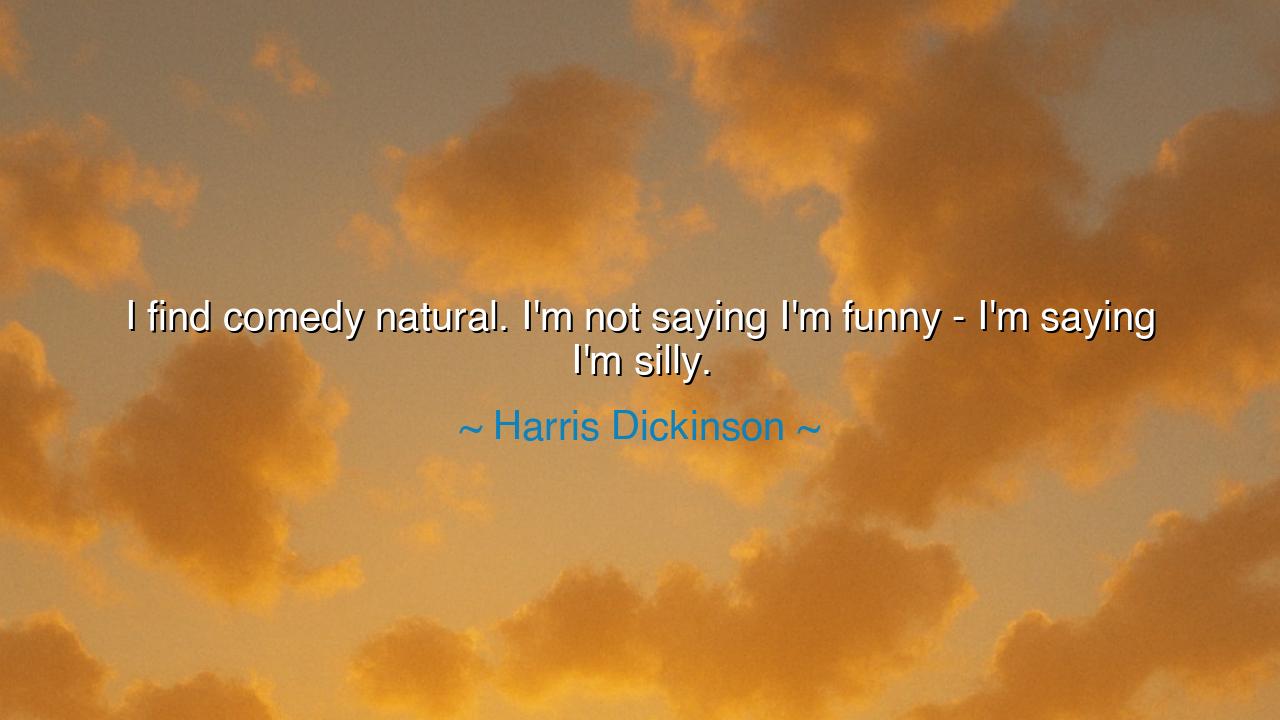
I find comedy natural. I'm not saying I'm funny - I'm saying I'm






The words, “I find comedy natural. I’m not saying I’m funny – I’m saying I’m silly,” come from Harris Dickinson, the English actor known for his emotional depth and quiet grace on screen. Though the quote may sound lighthearted, it carries within it a profound wisdom about the human spirit and the art of simplicity. In his humility, Dickinson draws a sacred distinction between being funny and being silly—between the intellect that seeks approval through laughter and the innocence that finds joy in play. To the ancients, this was no small insight, for they too believed that humor, in its purest form, was a mirror of the soul—a reflection of freedom, authenticity, and inner light.
To say that one “finds comedy natural” is to confess an ease with the absurdities of life. The ancients taught that wisdom is not only found in solemnity, but in the capacity to laugh at the world’s contradictions. Silliness, in its truest form, is the art of not taking oneself too seriously—it is the ability to embrace imperfection and to delight in it. Dickinson’s words remind us that the childlike spirit, though often dismissed, is among the purest expressions of humanity. To be silly is to surrender pride, to shed the heavy armor of dignity that adults too often wear, and to walk again in the lightness of wonder. It is not foolishness, but freedom—the liberation from self-importance.
In saying he is “not funny,” Dickinson speaks with humility and truth. To be funny is often to craft, to perform, to seek the laughter of others through cleverness or timing. But to be silly is to dwell in honesty, to let laughter arise naturally from being oneself. The ancients understood this distinction well. The fool in the king’s court, dressed in bright colors and bells, was never the fool in truth. His jest revealed wisdom hidden beneath laughter. In his silliness, he dared to speak truth where others could not. So too does Dickinson’s silliness point to something deeper—a spirit that is unguarded, real, and alive.
Consider the life of Charlie Chaplin, who through the art of comedy taught the world the power of vulnerability. His “Little Tramp,” clumsy and naïve, stumbled through hardship and humiliation, yet never lost his capacity for joy. The audience laughed, yes—but not merely at him. They laughed with him, recognizing in his silliness their own shared humanity. Chaplin did not strive to be funny; he allowed his heart to be open, his movements to be honest, and thus his art touched eternity. Like Dickinson’s reflection, his legacy teaches that silliness is the doorway to sincerity. Through laughter, we remember that to be human is to err, to fall, to laugh, and to rise again.
There is courage in silliness. To be silly is to risk being misunderstood, to risk the sneer of those who mistake lightness for weakness. Yet, as the philosophers taught, the soul that can laugh at itself is invincible. For the one who can laugh is the one who cannot be destroyed by shame or fear. In every age, the wise have known that laughter is the antidote to despair. It reminds us that life, with all its gravity, also carries delight. Harris Dickinson’s words, therefore, are not self-deprecation—they are a quiet declaration of strength. To be silly is to remain human in a world that worships pretense.
In this spirit, his statement becomes a gentle challenge: to rediscover the natural joy buried beneath our need for control. We live in an age that rewards perfection, composure, and seriousness. Yet Dickinson’s simplicity calls us back to what is essential. He reminds us that comedy is not learned—it is remembered, for it lives already in the heart that dares to play. When we are silly, we reconnect with the unfiltered part of ourselves—the part that once laughed freely, dreamed boldly, and found wonder in the ordinary.
So, my child, take this lesson to heart: do not be afraid to be silly. Do not guard yourself so tightly that you forget the joy of laughter. Let yourself stumble, sing out of tune, make faces, tell stories that make no sense. Be genuine rather than polished, playful rather than perfect. The world needs not more cleverness, but more honesty—more souls who can laugh without cruelty, who can find humor in life without losing compassion.
For in the end, Harris Dickinson’s words reveal a timeless truth: that silliness is sacred. It is the soul’s reminder that joy is not found in performance but in being. When we cease to perform, we discover connection—between ourselves and others, between heart and art, between the human and the divine. So laugh, not to impress, but to remember. Be silly, not to entertain, but to live fully. For in your laughter, the universe hears its own joy echoed back to it, and in your lightness, it finds the weight of its wisdom.






AAdministratorAdministrator
Welcome, honored guests. Please leave a comment, we will respond soon